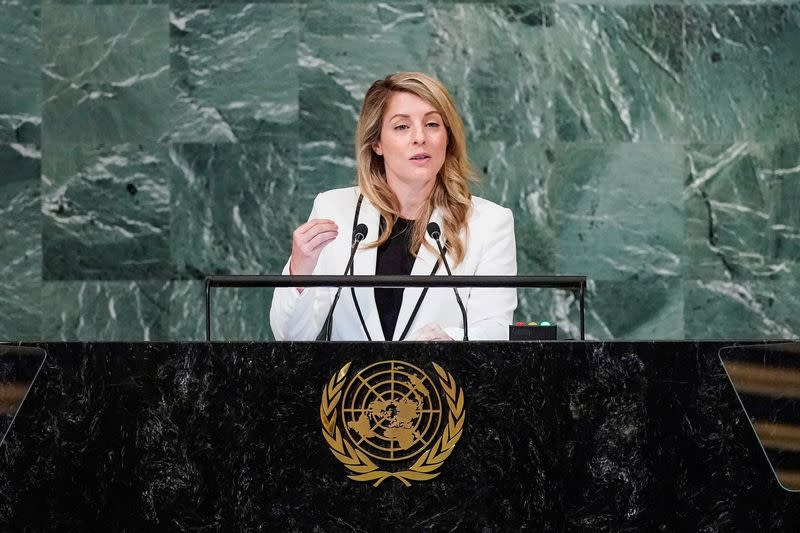Canada readies new Indo-Pacific strategy amid tense China ties

- Oops!Something went wrong.Please try again later.
OTTAWA (Reuters) -Canada will soon announce a new Indo-Pacific strategy to challenge China on human rights issues while cooperating with the world's second-biggest economy on climate change and other shared goals, Foreign Minister Melanie Joly said on Wednesday.
Canada sees relations with Indo-Pacific countries as vital to national security and its economic and environmental goals, Joly said in Toronto ahead of an official trip to the region.
China was an "increasingly disruptive, global power" Joly said, and would need to be a major part of the Indo-Pacific strategy expected to be announced within the next month.
"It's sheer size and influence makes cooperation necessary to address the world's existential pressures such as global health, nuclear non-proliferation, climate change and biodiversity loss," she added.
Diplomatic tensions between Canada and China have been running high since the detention of Huawei Technologies executive Meng Wanzhou in 2018 and Beijing's subsequent arrest of two Canadians on spying charges.
While tensions cooled when all three people were released last year, relations have remained sour, and Joly's remarks prompted a pointed retort from Beijing on Thursday.
"The relevant remarks by the Canadian side contravene the facts, are filled with ideological bias, and shamelessly interfere in the internal affairs of China," foreign ministry spokesperson Zhao Lijian told a regular media briefing.
"Defining it's so-called Indo-Pacific strategy is Canada's own matter, but no matter what regional strategy Canada proposes, the guiding principle should be mutual benefits and win-win, rather than zero-sum chess game and conservative Cold War zero-sum thinking," Zhao said.
In May, Ottawa banned the use of 5G gear from Huawei, citing national security concerns, and last week ordered three Chinese companies to divest from critical minerals in Canada.
This week Beijing pushed back against Prime Minister Justin Trudeau's accusations that China was attempting to interfere with Canadian elections and said Ottawa should stop making remarks that hurt relations.
Joly warned there were risks of doing business with China, telling Canadians, "you need to be clear-eyed. The decisions you take as business people are your own."
Joly said Ottawa, however, was investing to better understand how "China thinks, operates and plans."
To do that, Canada will spend C$50 million ($37 million) to bolster its network of China experts in embassies, a source close to the matter told Reuters.
Business groups welcomed the plans.
The Canadian Chamber of Commerce said the region holds "great potential for Canada," and that businesses planned to work with government to build on their economic activities in the Indo-Pacific.
($1 = 1.3479 Canadian dollars)
(Reporting by Ismail Shakil and Steve Scherer in Ottawa; additional reporting by Eduardo Baptista in Beijing; Editing by Grant McCool and Tom Hogue)

